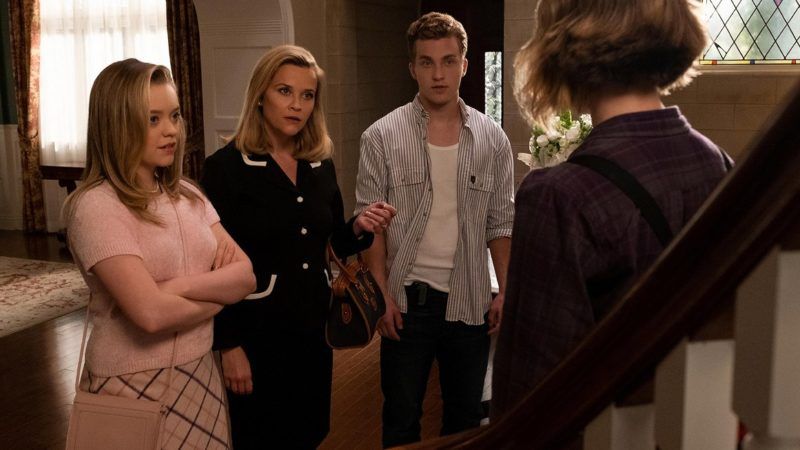Maternal Instincts, for Better and Worse, Drive Little Fires Everywhere
Reese Witherspoon is well on her way to becoming a television mogul.

Little Fires Everywhere. Available now from Hulu.
"There are so many secrets," murmurs a wistful character In Hulu's series Little Fires Everywhere. Also: lots of spying, duplicity, treachery, malice and—most of all—acts of confusing and confused maternal instinct. It's a show that's sometimes funny, sometimes, touching, often disturbing, and almost always hard to look away from except in horror.
Produced by and co-starring the budding mogul Reese Witherspoon—it's one of six current TV projects on which she's listed as executive producer—Little Fires Everywhere actually debuted last month and ends its run this week. But the big advantage of streaming networks is that their shows mostly remain available forever, and at least for the moment, Hulu is free.
The title of Little Fires Everywhere is drawn from its opening scene, where Witherspoon's character Elena Richardson (a reporter for the neighborhood newspaper in Shaker Heights, a posh suburb of Cleveland) is standing outside, watching her two-story Tudor-style mansion burn to the ground. A police investigator tells her it started with "little fires everywhere"—that is, it was an arson, and because Richardson was inside at the time, possibly a murder attempt.
From the outside, the obvious suspect is Elena's sullen, splenetic teenage daughter Izzie (newcomer Megan Stott, in a bravura and slightly frightening debut), who recently set her own hair ablaze after her mom casually observed that it was her best feature.
But as Elena is aware, Shaker Heights is actually cross-hatched with possible pyromaniacs. At the top of the list is newcomer Mia Warren (Kerry Washington, Scandal), a vagabond artist with a Las Vegas-sized stack of chips on her shoulder; tightly strung waitress Bebe Chow (Chinese art-house actress Lu Huang); and new adoptive mom Linda McCullough (Rosemarie DeWitt, United States of Tara). All of them are mothers with an intertwined and escalating set of grievances about their kids.
The two primary antagonists are Elena and Mia, who collide almost the moment the artist arrives in town in a wheezing old junker that disguises the fact that her schizy abstract photography is the rage of New York café society. Mia checks out a rental house that belongs to Elena, who in a fit of condescending white liberalism, offers to give her a break on the rent if she'll mow the lawn, then compounds her mistake by offering her a job as a maid. ("Home manager!" Elena immediately corrects herself.")
What turns this from awkward to poisonous is the two women's teenage children practically want to trade moms. Mia's daughter Pearl (Lexi Underwood, Family Reunion) is sick of living in cars and changing cities every few months; she longs for the white-picket-fence life of Elena's kids. And Elena's mutinous kid Izzy (her explanation of how she chooses her art projects: "I usually just do something that I think will piss off my mom, and then go from there") is mad for the anarchic ambiance surrounding Mia.
The four-way collision between the mothers and daughters instantly triggers jealousies that morph into malignant disputes on the nature of gender and racial identity, when cultural curation turns to appropriation, and, most sharply, the nature of motherhood. Is it defined by solely by bloodlines? And who gets to decide?
The battle lines are all the more sharply drawn because the warring armies are so different, but at the same time, they're so similar. Elena and Mia, at times, are practically polar opposites. Elena gave up her dream of working at The New York Times to stay in Shaker Heights; Mia passed up a chance to be the Art Nouveau princess of Chelsea to wander the grungiest urban back alleys of America.
Elena's sex life is rigidly modeled after that of the original Shaker commune that gave her town its name, with coitus permitted only two days a week. (Little Fires Everywhere is mostly set in 1997, but most of its suburban female characters seem to have wandered in from 40 years earlier. When Elena's book club takes up The Vagina Monologues, the women unanimously agree that none of them has ever actually looked at their ladyparts.) Mia couples wham-bam-thank-you-ma'am with the nearest target of opportunity and resolutely refuses to tell Pearl even the tiniest detail about her not-on-the-scene father.
Yet there are hints that Mia's disdain for structure may be rooted in something besides post-modern hippiedom. When Pearl has a minor teenage scrape with the cops, her mother is anything but free-spirited about it. "The last thing we need is to be on somebody's radar," she furiously warns the girl.
Both actresses have been warming up to play these characters for a long time, Washington in her hard-scrabble survivor role on Scandal and Witherspoon as the ditzy (though much less jagged) suburban housewife on Big Little Lies. And they've both tossed leading-lady egos aside to play thoroughly unappealing bullies whose sophisticate veneers quickly give way to the streetfighters inside. Watch out for them, but watch.


Show Comments (24)